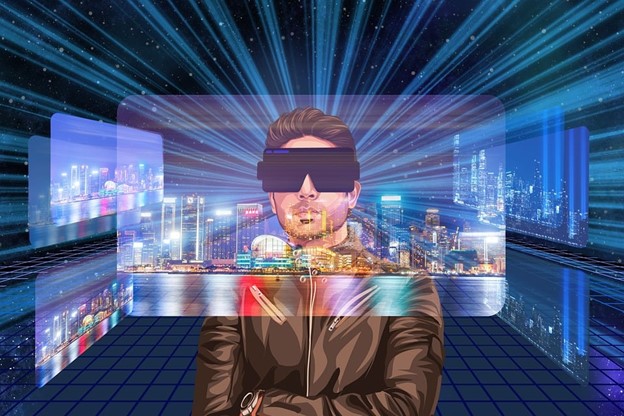The Metaverse is a hybrid of the actual and virtual worlds in 3D. It has been hailed as a promising trend for the future of education. The Metaverse is the focus of attention for educators.
The news that social media powerhouse Facebook was renaming and promoting itself as Meta sparked considerable interest in this virtual environment. Today, researchers, teachers, and policymakers have an opportunity to determine the education path while the Metaverse infrastructure is still being built. Let’s examine how the education sector is reclaiming the Metaverse’s advantages.

A Different Approach to Education
The Metaverse is not a novel idea in education, as numerous educators have addressed it. For instance, research by Kemp and Livingstone in 2006 examined ways to link Metaverse with learning management systems via the use of a virtual world named “Second Life.”
Picture a circular classroom that has whiteboards all around it and is filled with adjustable chairs. The narratives of the legendary Hercules and Greek myths fascinate students. Children get the opportunity to enter the Greek Metaverse.
They see the temples of the divine beings and the folks who worship them. We are given access to this lifelong, profound learning thanks to the Metaverse, which is presented in a hybrid, directed play environment.
Virtual and Augmented Reality
Metaverse can be accessed via the latest virtual reality headsets. VR headsets provide a sense of integrated presence. Users can roam around a 3D environment and engage with it like they would in the real world. The cost of VR technology is decreasing to the point where it can overcome worldwide capability disparities.
VR activates the motor center of the brain and develops muscle memory. It can train everything, from farming abilities to firefighting, in the same way a flight simulator trains pilots for crash landings. Spatial training, such as using the hands and body for too risky and unpleasant activities, is one skill that adds to the unique advantages of the Metaverse.
After the abundance of dull Zoom classes during COVID-19, visualization and storytelling are needed today. Learners can enter a different world or put themselves in another person’s position using VR technology. For example, DaVita, a pioneer in healthcare, uses an engaging, sensorimotor first-person story to foster patient compassion.
Entering Meta worlds makes visualizing situations, including challenging development problems, easier. For instance, a learner can start exploring living in a green Smart City or evaluate the transformation of a South Asian street using a VR headset.
Augmented reality is also a Metaverse technology. With AR, one can enhance a real-world experience by projecting images, movies, and sounds into an already-existing setting. A straightforward application of AR is to enhance course materials. For example, photographs, films, and sounds of combat could be added to a textbook page detailing World War II.
In a similar spirit, reading material on the functions of the heart might include photos, videos, and audio of the human heart placed on them. AR can therefore help with the development of customized multimedia instructional materials.
Artificial Intelligence
Artificial intelligence is a breakthrough technology related to the Metaverse. Computers can now complete tasks frequently linked to human intellectual processes thanks to AI. While computers are replacing humans in the workforce, artificial intelligence in education has mainly been restricted to tutoring software that strives to make teaching materials more personalized for students.
Knewton, an AI-powered framework that creates custom lesson plans specifically for students, is one illustration of this. In high schools and universities, these personalized AI-infused educational platforms are used more frequently.
Final Thoughts
As more students look for rich, dynamic, and compelling online learning environments, education will become increasingly decentralized, and more Metaverse programs will appear. Additionally, education will become more game-like. Game mechanics and game design components, like competition, points, and prizes, will increasingly be incorporated into virtual learning experiences.
